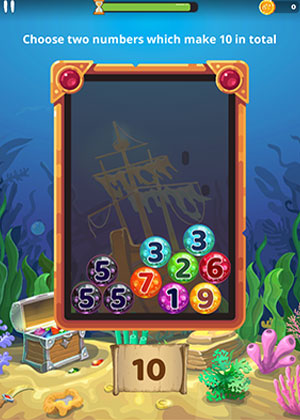In a school or academic setting, games can also be used as anchor points for learning or resources for engaging students with curricular content and skills. There are a lot of great resources that explore the educational value of games, both tabletop and digital. Rosen Publishing has a new series of books coming out in January 2015 entitled Teaching through Games. Game design also extends into learning environments as an excellent way have student apply content and skills, demonstrating understanding and mastery.
These games have an educational element to them, but also offer experiences that are good games in their own right. This isn't busywork to trick you into learning, but clever and innovative ways to encounter history, physics, engineering, maths, geography and language subjects without feeling like you are in school. They also teach softer, deeper skills like long term strategy, planning. Reading games for kids make learning to read even more fun! Play our free reading games online to sample our comprehensive learning games program, Brainzy. Get the fun started with these alphabet games, phonics games, sight word games, reading comprehension games, and more! If you're looking for practice sounding out words, try our phonics games.
What kind of gaming programs work well in academic libraries?
Funbrain is the leader in online educational interactive content, with hundreds of free games, books & videos for kids of all ages. Check out Funbrain here. By Bethany Petty The increasing availability of classroom technology can help teachers create fun and helpful review activities for their students. Check out these eight fantastic tools, all of which can be used to create awesome review activities for their students. Don’t miss these other quiz and study resources and tools for your classroom: 10. However, even when on lower graphical settings the game still looks great and is well animated. Unlike the previous games, Civilization VI has more of a cartoon-like feel to the environment, and that adds a more fun, less serious attribute to the game. It makes great use of colors and different landscapes in order to draw you into the game.
Events that correspond to the start of the semester or as a stress break during finals tend to work well, as these are times that the students are gathering and are ready for a recreational activity.
During the semester, the games need to better align to curricular goals, as students are more focused on coursework.
Many college campuses will also have a gaming club already established. Work with them to find out when their big events are, so you are not competing for the same audience at the same time.
Model Programs
Library Dusk , Charles C. Myers Library, University of Dubuque, Dubuque, IA
Audience: upper-level students in course in their major
Attendance: 12-24
Budget: $0 (unless audience response system is not yet available)
Description: Information literacy session for upper-level communication course. Student-driven lecture format uses 'clickers' and linked PowerPoint slides. The goal of the activity is to find usable sources through a “choose-your-own-adventure” style search process. Students vote on the choices of how to proceed and share in a discussion of the rationale and results of those choices.
Information Literacy outcomes: Identifies key concepts & terms that describe the information need (1.1e); Identifies the value and differences of potential resources (1.2c); Identifies keywords, synonyms, and related terms (2.2b); Selects controlled vocabulary specific to the discipline (2.2c); Repeats search using revised strategy (2.4c)
Gaming strategies: clear goals, monitored practice, continuous feedback, risk-taking, just-in-time learning, personalization
Tips: There is considerable prep time – concept-mapping first will allow you to have a visual idea of where each link leads before setting up the slides.
Feedback from students: 'Wow. I learned a lot today.' “I did like how you gave us an option for going our own paths.” “I thought the voting was great.” “It was a lot more fun being able to first handily interact with the research.”
Source Exploration activity, Charles C. Myers Library, University of Dubuque, Dubuque, IA
Audience: 100-level students who have already had basic research introduction (library catalog, basic databases)
Attendance: 12-18
Budget: $0
Description: Information literacy session for 100-level research writing course. Students see librarians for 8-9 sessions throughout the semester as they work on 3 research papers in various disciplines. This session takes place after students have used the library catalog and basic databases to find resources for the first paper. Small groups of students receive sample research questions and an assigned type of source, i.e. encyclopedia articles, books, articles, websites.
After some work time, each group must demonstrate their process to the class and discuss how the source(s) they found will be helpful in a research paper. Students share tips & tricks they learned with their classmates and get a chance to practice using library resources further in a fun way. As students share, librarians ask clarifying questions using a rubric to gauge students' understanding of the process, such as focusing on how students decided which database to use or how to locate full-text of an article. The final group, assigned to find websites, is asked to discuss how they chose quality websites, leading to a student-driven discussion of web evaluation.
Information Literacy outcomes: Participates in peer work groups (1.1a); Identifies purpose and audience of resource (1.2d); Investigates scope & content of systems (2.1c); Assesses the quantity, quality & relevance of results (2.4a); Determines probable accuracy of information (3.4e); Determines if information satisfies needs (3.4a); Participates in classroom discussion (3.6a); Communicates search process (4.2a)
Gaming strategies: Explore-Think-Rethink, open-ended exploration, situated meaning, well-ordered problems, personalization, clear goals, practice of skills
Tips: Initially this session was conceived as a review activity toward the end of the semester. Students generally responded that it would be better earlier in the semester. Librarians moved it to the beginning of the second of the 3 units in the class, and it is a much better fit.
Academic Games League
Student feedback: “I thought the activity was useful, however, it seemed to be a big review… But reviews are always helpful–it made me feel like I knew what I was doing and I feel really confident in my research skills.”
“I get it and I like not being told what to do.”
“You want what?”
“I was confused on what we were supposed to do.”
University of Michigan Computer & Video Game Archive, Ann Arbor, MI
Audience: staff, faculty & students
Description: Working archive of computer & video games for in-house use.
Video Game & Gaming Collection University of Illinois Library, Urbana IL:

Audience: students, researchers
Description: David Ward and Mary Laskowski at the The University of Illinois Library have developed a combination of public and classroom support programs to investigate best practices for integrating games as teaching tools into academic curricula. Their “Gaming Initiative” supports innovative teaching and research partnerships both within the academic community, and between campus and the gaming industry. Learning outcomes include: students analyzing how culture and technology affect societal growth using Civilization IV on reserve and in a library gaming lab; and students discussing and comparing the role of music in gaming through a program featuring campus researchers and local game company Volition.
Lake City Community College Library Game Night, Fort White, FL
Audience: community college students and local residents
Description: Combines free play and tournaments for the local community
'(Who Wants to be) A Successful Attorney?' Game, Pappas Law Library, Boston University School of Law, Boston MA
Audience: law school students
Description: Modeled after (Who Wants to be) a Millionaire? with progressively more difficult question about library resources
Gamecube and games available at the Edward A. Block Family Library, Riley Hospital for Children, Indianapolis, IN
Audience: Hospital patients
Description: Computer games, board games and puzzles also available.
Get Game @ ZSR Z. Smith Reynolds Library, Wake Forest University, Winston-Salem, NC
Audience: college students
Attendance: 50
Budget: $425, for rental of screens and purchase of the food.

Description: Friday night program featuring free pizza, soft drinks, and cookies alongside Madden (XBox) and Halo2 (PS2) along with other games brought by students. Result? Academic library 'gains credibility with its students and demonstrates its relevance in the fast-paced digital world.'
Tips: Try a tournament, update games & equipment.
Resources:
- Womack, David H 'Giz.' Got Game at ZSR: The How and Why of Game Nights at the Library'Computers in Libraries, April 2006
Academic Games Free
In what ways can games be used for information literacy?
Listed below are some of the ways you can incorporate games into instruction at your library. Included are game elements that are of simple, moderate, or advanced difficulty to incorporate. When possible, examples are also included with the different game elements. This information was originally presented by Rachael Elrod and Cecilia Sirigos at The Citadel, Daniel Library and modified and expanded for the Game Making Interest Group.
Simple:
Using a backstory that makes the 'problem' more meaningful to students or patrons to solve or research
This could include setting up a scenario that students need to solve by researching in the library databases.
Use of first-person point of view
Again, similar to the backstory in that patrons are given a scenario to work through.
Great Academic Games Online
Moderate:
Library Scavenger Hunts
QR Code Quest: A Library Scavenger Hunt-http://www.thedaringlibrarian.com/2011/03/qr-code-quest-library-scavenger-hunt.html
The Great Library Scavenger Hunt-http://mowyn.com/scavenger/
St. Louis Public Library Scavenger Hunt-http://www.slpl.lib.mo.us/kidzone/stuff/hunt2.htm
Mystery in the Library
Gleason Public Library-http://teensofgleason.blogspot.com/2009/05/mystery-in-library.html
Company that sells scripts for Library Mysteries-http://www.pennywarner.com/librarymysteries.html
Mystery in the Library Kit for purchase-http://www.merrimysteries.com/tmm/kits/library.htm
Advanced:
Academic Games League Of America
Collaboration with other departments on campus or other groups in the community.
Create your own games using coding or software.
GameMaker 8.1 Lite (free with optional purchase upgrade)-http://www.yoyogames.com/gamemaker
Softimage-http://usa.autodesk.com/adsk/servlet/pc/index?id=13571168&siteID=123112
May-http://usa.autodesk.com/maya/
Java-http://www.java.com/en/
Adobe Flash-http://www.adobe.com/products/flash.html
